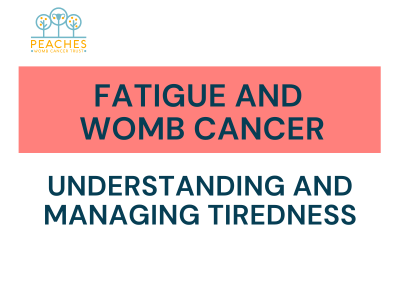Understanding and Managing Tiredness During and After Womb Cancer Treatment.
During Gynaecological Cancer Awareness Month, we’re shining a light not only on the signs and symptoms of womb cancer, but also on what happens after diagnosis — including one of the most common and frustrating side effects – fatigue.
Fatigue is more than just feeling tired. It’s a deep, persistent exhaustion that doesn’t always go away with rest, and it can affect every part of life — from getting through daily tasks to how you feel emotionally.
Whether you’re in the middle of treatment or finding your way after cancer, you’re not alone in feeling this way. At Peaches, we want to help you understand fatigue and share some realistic, gentle ways to manage it.
What Does Cancer-Related Fatigue Feel Like?
Fatigue during or after womb cancer treatment can feel very different from everyday tiredness. People often describe it as:
- A constant lack of energy, no matter how much they rest
- Feeling “wiped out” after even small tasks
- Trouble concentrating or thinking clearly (sometimes called “brain fog”)
- Physical heaviness or weakness
- Emotional exhaustion or irritability
It’s important to remember that this kind of fatigue is a recognised side effect — not a sign of weakness, and it’s not something you can just push through.
What Causes Fatigue in Womb Cancer?
Fatigue can have many causes, sometimes all happening at once, including:
- Cancer treatments such as surgery, radiotherapy, chemotherapy, or hormone therapy
- Emotional stress, anxiety, or low mood
- Disrupted sleep or hormonal changes (especially after menopause or hysterectomy)
- Anaemia (low red blood cell count) after treatment
- Other health conditions such as thyroid issues or poor nutrition
Sometimes, fatigue is also linked to the body’s healing process — both physically and emotionally.
Managing Fatigue During and After Treatment
There’s no quick fix for cancer-related fatigue, but small, manageable steps can make a real difference over time.
Here are some practical ways to cope:
1. Pace Yourself
Give yourself permission to do less. Focus on what’s essential and break tasks into smaller steps. Listen to your body and rest before you feel completely drained. Try to avoid the “boom and bust” cycle — doing too much on days when you feel better can lead to a crash in energy the next day. Instead, aim for a steady pace by spreading out tasks and allowing time for rest, even when you’re feeling good.
2. Move Gently
Light activity, like walking or stretching, can boost energy over time. Start slow — even a few minutes a day can help.
3. Eat to Nourish
Aim for small, balanced meals throughout the day. If appetite or taste changes are making this hard, talk to your healthcare team or a dietitian.
4. Improve Sleep Quality
Create a calming bedtime routine, limit screen time in the evening, and keep naps short and earlier in the day so they don’t disrupt night-time sleep.
5. Ask for Help
Let friends and family know how they can support you — whether it’s a cooked meal, a lift to an appointment, or simply someone to listen.
6. Track Your Energy
Keep a diary to spot patterns. You might find certain times of day when you feel more able, or notice which activities are most draining.
7. Talk to Your Medical Team
If fatigue is impacting your life, ask your doctor to check for treatable causes like anaemia or thyroid issues. They may also be able to refer you to specialist support.
Be Kind to Yourself
Fatigue can be invisible to others, but it’s real and valid. There’s no “right” pace for recovery, and no need to rush. Healing is a process, and rest is an important part of it.
We’re Here for You
Whether you’re in treatment or adapting to life after womb cancer, Peaches is here to support you. We can offer information, emotional support, and practical advice to help you cope with fatigue and other side effects.
If you’d like to speak to someone who understands, get in touch at [email protected].


